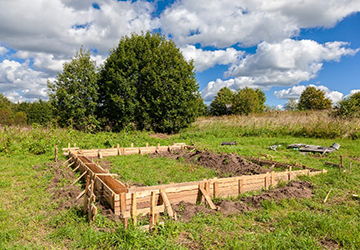Vacant land is a real estate investment that can be used in various businesses, from parking lots to farming, to generate a tidy profit. Learning how to buy land requires extensive research and understanding of different land types, characteristics, and uses. Find the property you want to buy, then research essential aspects such as location and ownership history before financing the purchase. Homebuilders use housing land to create new districts or to build detached houses for owners.

Factors to consider when looking for residential property and land
Before building a house, you must buy a residential plot or land. We have compiled a list of critical factors when purchasing a residential property.
Place
Location, location, location Sayings about real estate are our primary concerns when buying the perfect property. Regardless of the motivation, location is the most critical factor in home purchases. When investing, avoid buying land that has no resale potential. When building your home, choose a place where you enjoy spending time.
Before buying any residential property, you should have a general idea of where you want to buy. You can use online resources to help you with your test drive. For example, if you're buying real estate to build a home, you may want to consider the convenience of local restaurants, grocery stores, schools, and workplaces.
Service Notes
Because buying a vacant lot or lot opens up opportunities, it can also bring headaches and challenges that don't exist when purchasing an existing home. For critical services, note the following:
Before buying, Find out if the property has municipal or city water and sewer connections.
Check whether attaching a purchase agreement clause to the purchase of land is recommended. For example, you may be unable to drill wells because water rights are not transferred with the ground in some places.
Ensure that the residence has telephone and electricity connections. If the cable connection is essential to you, check it out.
Deed and Ownership History
You can build a house after knowing the availability of the essential services you need. Before you start, there are a few things to consider about zoning and property access.
An official document called a deed transfers property ownership from one party to another. Because unoccupied land may still need legal review, figuring out ownership history when buying land can sometimes be more difficult. On the other hand, properties with buildings must have had at least a title search, and usually, any title disputes have been resolved.

Ensure the type of dwelling you intend to build is legal by checking the deed's restrictions on the site. For example, some places restrict the construction of prefabricated houses. If the property is part of a proposed development, you should request a copy of the deed restrictions. You'll find the limit on the most prominent house you can build, the number of places you can make, and other conditions. You should check with the city or county if the area has zoning changes or plans to build new roads or widen existing roads.
If you are considering purchasing a property, pay for thorough property research and purchase property insurance. A title, trust, or estate law firm can do this. This will show whoever has a title or a registered lien on the property.
Land financing scheme
No one always has the money to buy residential land outright. If you still need to, you need to get funding. One option is a real estate loan, where real estate is used as security. If something goes wrong, the lender may seize and sell the property to recoup most of the investment.
For lenders, however, vacant land poses risks. After all, if you're short on cash, you're more likely to pay for an existing residence and other emergency expenses than if you're vacant. Lenders may require shorter loan terms, higher down payments (minimum 20%), and good to excellent credit to reduce risk.
There are other ways to finance real estate. You can also take out unsecured personal loans with shorter terms and higher interest rates. Additionally, you can apply for a line of credit or a home equity loan with your home as collateral. The downside is that your home could be at risk if something goes wrong.
How to Find Land for Sale
Realtors can be valuable resources when looking for land. Their network of industry experts, including real estate developers and contractors, gives them access to all properties in the MLS (on the market) and properties not listed in the MLS (off-market).
However, some homebuyers are surprised that not all realtors have experience buying a home or property. The country is a specialized field of work. Don't think that just because an agent has a real estate license, they can help you buy a property.
An agent with an extensive record of closings in residential complexes will be an even more excellent resource than your usual resale agent. He helped with everything from correctly filling out the purchase agreement to negotiating special terms to finding a home lender. For this nature, you should hire a real estate agent with experience handling residential real estate sales.








